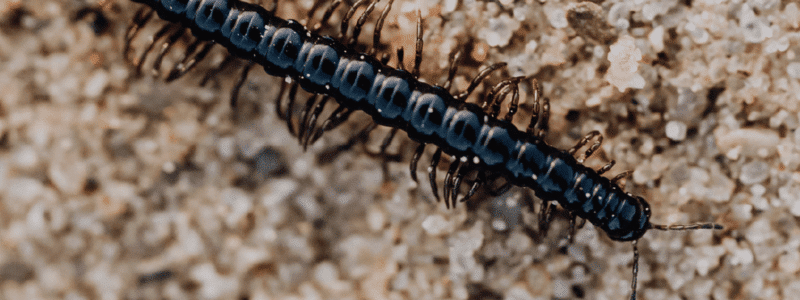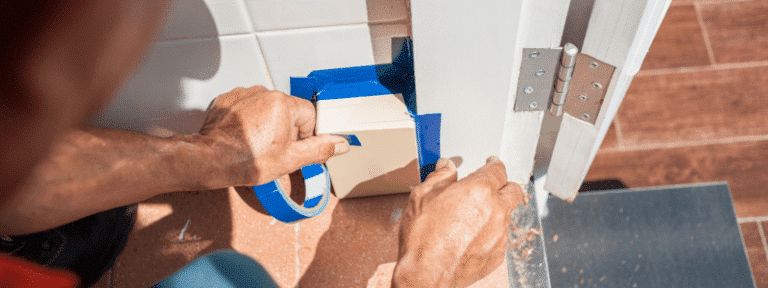For the most part, humans and centipedes tend to avoid each other, but when centipedes are nearby or in your home, it can be worrisome – especially if you’re wondering if centipedes are poisonous.
To keep you best educated about centipedes, we’ll go over the following:
- Are house centipedes poisonous?
- Are centipedes dangerous to humans?
- What do centipede bites look like
- How to identify centipede infestations
- How to prevent centipedes from getting inside
Read more so that you can have a better understanding of centipedes in Arizona and the risk they pose.
Are House Centipedes Poisonous?
Technically, house centipedes are poisonous. However, the species of centipedes in your home in Arizona produce venom that is not as toxic as other species and rarely causes severe effects on humans or pets.
Similarly, even though a centipede scurrying full speed out of a crack or from under your refrigerator is unpleasant, they are not aggressive. The likelihood of being bitten by a house centipede is extremely low.
Are Centipedes Dangerous to Humans?

Though house centipedes in Arizona don’t typically have venom that can harm humans, their bite can still hurt and cause localized reactions. Similarly, it is not recommended to assume that all centipedes you see are common house centipedes, and handling them will dramatically increase the chance you are bitten. Contact a local medical professional immediately if there are apparent medical concerns after a centipede bite.
Much like bees and other insects that bite and sting, there can be allergies to centipede venom. This is another reason that while their venom and bite aren’t considered significantly poisonous to humans, they can still pose a threat and are best left alone.
What Does a Centipede Bite Look Like?
Centipedes use pincer-like tips at the front of the legs closest to their head to penetrate the skin and inject venom. These pincers are called forcipules, and there are typically two of them. As a result, the centipede bite usually resembles a V-shape due to the positioning of the pincers.
A typical centipede bite will react much like a minor bee sting or other bug bites – it will swell, turn red, and there can be mild to moderate localized pain. Studies have shown that most house centipede bites don’t require concern and subside after several hours to one day.
How to Identify Centipede Infestations

Centipedes are generally shy, so if you see multiple of them running across your property, it is the best sign of a centipede infestation. Past that, here are some signs that there are centipedes inside your home:
- Increase in Other Pests: Ants, beetles, and other pests are often attracted to the same things centipedes are. If you see other pests around your house in conjunction with a centipede, it may be an indicator to look more seriously into the possibility of a centipede infestation.
- Clutter: Centipedes hide in dark spaces, which can be artificially created by boxes, newspapers, or other clutter around the house. Cleanup might be in order if you see a centipede near some of this clutter.
- Moisture or Standing Water: Centipedes are often just looking for resources to help them live, and water stands at the top of that list. If you have dark, damp areas that they can hide in or water on surfaces that they can drink, they will be drawn to it.
While centipede infestations are not easy to spot without seeing the pests themselves, keeping a generally tidy home is a great way to pre-empt them from entering it.
How to Prevent Centipedes from Getting in Your House
While centipedes aren’t necessarily dangerous to humans via their bite, having them in your house is not ideal for your health and the health of your home. To prevent centipedes from being attracted to your house, we recommend the following:
- Reduce openings in your Home: Sealing cracks and gaps in your foundation, walls, and any other structures leading inside will prevent centipedes and other pests from getting through them.
- Remove piles of wood, newspaper, and other clutter: If centipedes like to hide among dark, cluttered spaces, removing them would be a smart move to prevent them from nesting in your home.
- Get rid of standing water and moisture sources: Centipedes are attracted to water sources, so making sure there is not an excess in your house will prevent them.
- Get professional centipede pest control: Having a pest control technician appraise your home every year or so will allow them to check for centipedes and any other potential pests in Arizona.







